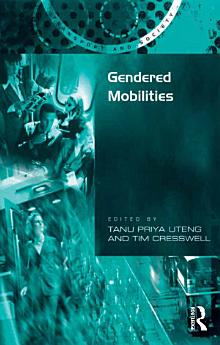Gendered Mobilities
Tim Cresswell
এপ্ৰিল ২০১৬ · Routledge
ইবুক
288
পৃষ্ঠা
family_home
যোগ্য
info
reportমূল্যাংকন আৰু পৰ্যালোচনা সত্যাপন কৰা হোৱা নাই অধিক জানক
এই ইবুকখনৰ বিষয়ে
Being socially and geographically mobile is generally seen as one of the central aspects of women's wellbeing. Alongside health, education and political participation, mobility is indispensable in order for women to reach goals such as agency and freedom. Building on new philosophical underpinnings of 'mobility', whereby society is seen to be framed by the convergence of various mobilities, this volume focuses on the intersection of mobility, social justice and gender. The authors reflect on five highly interdependent mobilities that form and reform social life: *
লিখকৰ বিষয়ে
Tanu Priya Uteng is Research Fellow in the Department of Civil and Transport Engineering, Norwegian University of Science and Technology, Norway. Tim Cresswell, is Professor in the Depatment of Geography at Royal Holloway, University of London, UK.
এই ইবুকখনক মূল্যাংকন কৰক
আমাক আপোনাৰ মতামত জনাওক।
পঢ়াৰ নির্দেশাৱলী
স্মাৰ্টফ’ন আৰু টেবলেট
Android আৰু iPad/iPhoneৰ বাবে Google Play Books এপটো ইনষ্টল কৰক। ই স্বয়ংক্রিয়ভাৱে আপোনাৰ একাউণ্টৰ সৈতে ছিংক হয় আৰু আপুনি য'তে নাথাকক ত'তেই কোনো অডিঅ'বুক অনলাইন বা অফলাইনত শুনিবলৈ সুবিধা দিয়ে।
লেপটপ আৰু কম্পিউটাৰ
আপুনি কম্পিউটাৰৰ ৱেব ব্রাউজাৰ ব্যৱহাৰ কৰি Google Playত কিনা অডিঅ'বুকসমূহ শুনিব পাৰে।
ই-ৰীডাৰ আৰু অন্য ডিভাইচ
Kobo eReadersৰ দৰে ই-চিয়াঁহীৰ ডিভাইচসমূহত পঢ়িবলৈ, আপুনি এটা ফাইল ডাউনল’ড কৰি সেইটো আপোনাৰ ডিভাইচলৈ স্থানান্তৰণ কৰিব লাগিব। সমৰ্থিত ই-ৰিডাৰলৈ ফাইলটো কেনেকৈ স্থানান্তৰ কৰিব জানিবলৈ সহায় কেন্দ্ৰত থকা সবিশেষ নিৰ্দেশাৱলী চাওক।






